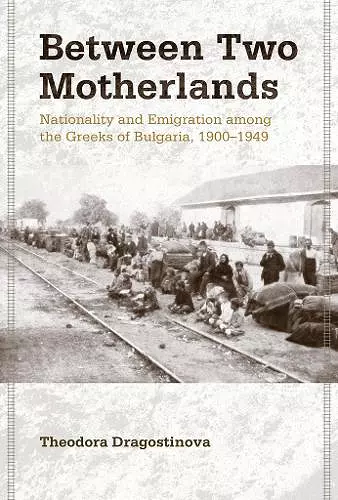Between Two Motherlands
Nationality and Emigration among the Greeks of Bulgaria, 1900–1949
Format:Hardback
Publisher:Cornell University Press
Published:15th Apr '11
Currently unavailable, and unfortunately no date known when it will be back

In 1900, some 100,000 people living in Bulgaria—2 percent of the country’s population—could be described as Greek, whether by nationality, language, or religion. The complex identities of the population—proud heirs of ancient Hellenic colonists, loyal citizens of their Bulgarian homeland, members of a wider Greek diasporic community, devout followers of the Orthodox Patriarchate in Istanbul, and reluctant supporters of the Greek government in Athens—became entangled in the growing national tensions between Bulgaria and Greece during the first half of the twentieth century.
In Between Two Motherlands, Theodora Dragostinova explores the shifting allegiances of this Greek minority in Bulgaria. Diverse social groups contested the meaning of the nation, shaping and reshaping what it meant to be Greek and Bulgarian during the slow and painful transition from empire to nation-states in the Balkans. In these decades, the region was racked by a series of upheavals (the Balkan Wars, World War I, interwar population exchanges, World War II, and Communist revolutions). The Bulgarian Greeks were caught between the competing agendas of two states increasingly bent on establishing national homogeneity.
Based on extensive research in the archives of Bulgaria and Greece, as well as fieldwork in the two countries, Dragostinova shows that the Greek population did not blindly follow Greek nationalist leaders but was torn between identification with the land of their birth and loyalty to the Greek cause. Many emigrated to Greece in response to nationalist pressures; others sought to maintain their Greek identity and traditions within Bulgaria; some even switched sides when it suited their personal interests. National loyalties remained fluid despite state efforts to fix ethnic and political borders by such means as population movements, minority treaties, and stringent citizenship rules. The lessons of a case such as this continue to reverberate wherever and whenever states try to adjust national borders in regions long inhabited by mixed populations.
In this deeply researched and thought-provoking book, Theodora Dragostinova uses the case of the Greeks of Bulgaria during the first half of the twentieth century to shed new light on the agency of orgdinary people in shaping notions of national identity while negotioating their way under the pressure of elite-led nationalization projects. Based largely on documents mined in fifteen central and provincial archives in Greece and Bulgaria, this book represents a significant contribution to the field of nationalism studies by vividly highlighting the fluidness and ambiguity of nationness.. Dragostinova has given us a first-rate analysis of the fluid nature of individual national identification though periods of histrical upheaval.
-- Max Bergholz * Canadian Journal of Histor *Theodora Dragostinova's masterful study of the Greeks of Bulgaria begins with her honest admission that the book is the product of her own life between two motherlands.. It is precisely the absence of any national prejudices that makes this book remarkable.
-- Anastasia Karakadidou * American Historical Review *We are fortunate... to have more solid information regarding the Greeks in Bulgaria and their mitigation to Greece in Theodora Dragostinova's Between Two Motherlands: Nationality and Emigration among the Greeks of Bulgaria. Dragostinova’s itinerary through three countries, Bulgaria, Greece, and the United States, as well as her proficiency in three languages, Bulgarian, Greek, and English, make her the ideal researcher on this subject.... Dragostinova’s book is a well documented and objective analysis of a subject typical of the ethno-political reality of southeastern Europe during the twentieth century, an area that lost its unity as [an] integral part of the Ottoman Empire under the pressure of the local nationalisms.
-- Andronikos Falangas * Journal of the Hellenic Diaspo- Winner of Honorable Mention, 2013 Joseph Rothschild Prize in.
ISBN: 9780801449451
Dimensions: 235mm x 155mm x 25mm
Weight: 907g
320 pages